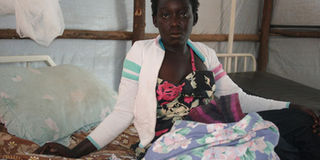How I conquered the dreaded meningitis

Salama Ayub narrates her narrow escape on her hospital bed in the Isolation Ward at Arua Regional Refferal Hospital. PHOTO by Felix Warom
“I am Salama Ayub, and I am 15 years old and in Primary Seven at Arua International Primary School in Oli Division, Arua Municipality. In February I was rushed to Arua Regional Referral Hospital unconscious. I was not sick I just remember returning home from school and suddenly experiencing general body weakness, stiff neck and severe headache.
Out of the blue I started shivering and the next thing I remember was lying in a hospital bed.
I cannot tell exactly where I might have contracted this disease but it could have been anywhere either at school, home or in the neighbourhood.
At the hospital, my mother was told I had symptoms similar to that of a person with meningitis. I was taken to the isolation ward and treated, with instructions to get plenty of rest.”
The type of meningitis that Ayub is suffering from has not yet been discovered as blood samples have to be taken to the government laboratory, which take a while before being confirmed.
Doctors say they treated her for meningitis because of the symptoms she presented.
According to medical personnel at the hospital, Ayub’s recovery was faster because she was feeding normally.
The Arua District Health Officer, Dr Patrick Anguzu, says there is need to have quick response in referrals of any suspected case from villages to health centres. This, he says, is because the disease can kill within 48 hours, if not treated.
He adds that some cases become resistant to antibiotics, making it difficult to detect.
In Ayub’s case, her family thought she had a bad case of malaria but not meningitis because of the fever she was running.
The Arua Municipal Health Officer, Dr Paul Onzubo, characterises these as symptoms of acute meningitis. He said: “Acute meningitis is caused by bacteria. Symptoms for acute include neck pain and stiffness and left untreated, someone can develop convulsions and mental problems.”
Dr Onzubo said people with low immunity, are malnourished, have cancer or HIV/Aids are prone to meningitis.
He said reocurrence is rare but added that when it happens it is usually due to exposure of spinal cord membrane.
“It is rare for one to be re-infected by meningitis once someone suffered from it unless there is a new infection or damage that is caused to the brain membrane,” he added.
There are no drugs for treating viral meningitis but symptoms include vomiting, high fever and headache. Dr Onzubo said: “If antibiotics are administered, they clear the germs surrounding the spinal cord.”
Experts say practising good hygiene and not sharing drinks, foods, and straws, eating utensils, lip balms or toothbrushes can control the spread of the disease.
Dr Onzubo recommends getting enough rest, regular exercising, and eating a balanced diet.
Since December when the disease broke out in West Nile, Arua hospital has registered 25 cases at the isolation ward but so far only one case from Koboko District has been confirmed.
However, many cases have been registered in refugee camps in Arua and Koboko districts.
tips to note
•Meningitis is an infection of the thin lining that surrounds the brain and spinal cord. Often transmitted by coughing or sneezing, it can cause complications including brain damage and deafness.
•The region is prone to meningitis outbreaks as it lies on the epidemic belt stretching from West Africa, West Nile and Karamoja areas.
•In 2007 and 2008, more than 830 cases of people infected with meningitis were reported in the five districts of Arua, Yumbe, Nebbi, Koboko and Maracha/Terego.




